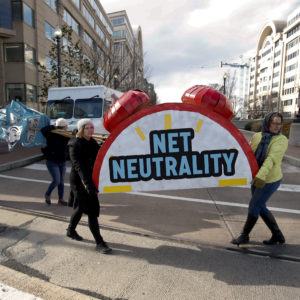The new Democratic House majority has a lot on its plate — including high priority items like protecting the Mueller investigation and getting the federal government reopened. But even in the crisis-a-day atmosphere of the Trump era, Democrats must also make room for the more mundane, but equally vital, work of legislative policymaking.
Given the realities of divided government, there won’t be too many opportunities for progressives to enact their priorities into law. On items like climate change, voting rights and health care, for example, it is likely that the new majority will be limited to making a record and developing proposals they can move on during the next Democratic
Net neutrality is the idea that all internet traffic should be treated equally and that no company should be allowed to block access to lawful websites, manipulate data for anticompetitive purposes, or censor or discriminate against anyone online. It’s like a Bill of Rights for internet users, keeping cyberspace open and free for all and protecting diverse voices and communities online.
Progressives have been fighting for net neutrality for years. Liberal lion Henry Waxman pushed for legislation on the subject almost a decade ago, but couldn’t persuade Republicans to come to the table. President Obama’s first FCC Chairman Julius Genachowski passed regulations implementing net neutrality in 2010, only to see them struck down by the courts that questioned the FCC’s legal power to enact these rules.
In response, President Obama’s second FCC chair, Tom Wheeler, tried a more controversial, hybrid approach, marrying net neutrality with a broader regulatory superstructure called “Title II” that was designed to address the court’s jurisdictional objection. The problem is, both Title II and a companion provision called “General Conduct Regulation” included in the Wheeler rules radically expanded the FCC’s reach into the internet ecosystem and undermined support for the core net neutrality protections to which they were married.
Title II and the General Conduct rule divided Democrats by going far beyond the traditional open internet protections and potentially harming rural areas and communities of color by slowing new deployment and upgrades for broadband. The Communications Workers of America and the NAACP questioned the effect on jobs and working people who depend on broadband. At the same time, such a far-reaching and unpredictable regulatory approach eliminated any possibility of Republican support.
Thus, it is no surprise that immediately after the 2016 elections, the Trump administration seized on these divisions and revoked the Wheeler rules.
Amid all this back and forth, however, something critical happened — a new bipartisan and cross-industry industry consensus formed to support the core provisions of net neutrality, including a ban on blocking websites, throttling traffic, or anticompetitive “paid prioritization.” Republicans and even industry players who once resisted net neutrality now recognize the need for basic legislation to ensure everyone has full and open access to the internet, and they reject the uncertainty and neck-snapping policy shifts that trying to solve the problem at the FCC has delivered.
For Democrats, this creates a major opportunity, a chance to prove that government can work and that progressive ideas can cross over into the mainstream and win bipartisan support. That would send a clarion message to voters that the new majority is capable, responsible and effective — that it can deliver where recent tea party Congresses repeatedly failed.
To get this done, however, will require smart, focused legislating by the new majority, which unfortunately is no sure thing. While there is a clear bipartisan support for the core, progressive version of net neutrality — the no blocking, no throttling, no prioritization rules championed by Henry Waxman and Julius Genachowski — that consensus falls apart when it comes to fringe add-ons like Title II public utility regulation or vague general conduct standards.
As a result, House leaders stand at the crossroads on net neutrality. They can pass a fringe, Christmas tree bill that lashes net neutrality to far more extreme ideas like Title II and general conduct regulation, staking out an extreme-pro-regulation position with a message bill that will be DOA in the Senate. Or they can pass a strong “clean” net neutrality bill featuring the core protections progressives have championed since the original Waxman legislation — a narrower but powerful bill that could win bipartisan support in both the House and Senate and serve as a landmark win validating the power and effectiveness of the new majority for all to see.
Some choices are difficult, but this one is both a political and policy no-brainer. It would bring a long-running issue to a successful conclusion for Democrats — protecting internet users and strengthening competition in the digital economy while delivering on a campaign promise despite the obstacle of divided government.
Democrats should move quickly on clean net neutrality at once.

